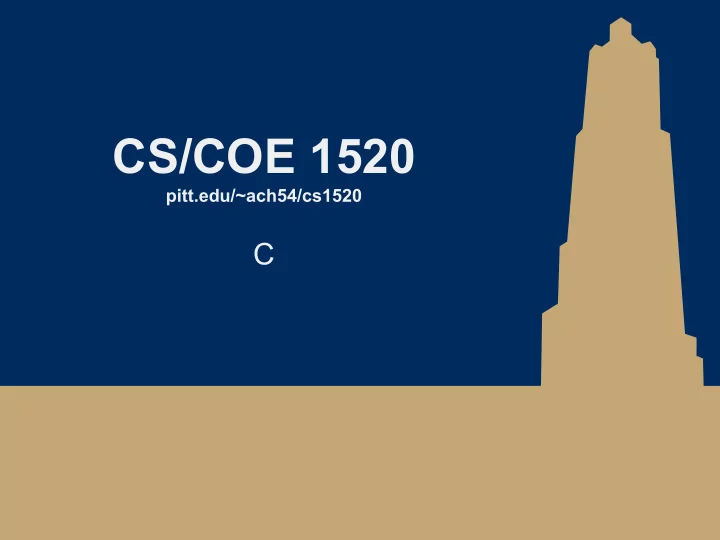

CS/COE 1520 pitt.edu/~ach54/cs1520 C
C ● Developed by Dennis Ritchie as a language to build utilities for Unix ● Grew out of Ritchie’s work to improve the B programming language ● The first C Compiler was included with Version 2 Unix in 1972 ● By Version 4 Unix, the kernel was reimplemented in C ● Current version is C18 2
Hello World #include <stdio.h> int main(void) { printf("hello, world\n"); } 3
Basic Syntax #include <stdio.h> #include <stdlib.h> #include <time.h> int main(int argc, char **argv) { char str[25]; srand((unsigned) time(NULL)); unsigned int r = rand() % 100; while(r < 85) { if(r > 75) { printf("%u: so close!\n", r); } else if(r > 45) { printf("%u: Getting there...\n", r); } else { sprintf(str, "%u: Still so far away!\n", r); printf("%s", str); } r = rand() % 100; } printf("OUT!\n"); } 4
Typing ● Unlike JavaScript and Python, C is statically typed ● However types can be cast from one type to another 5
Basic Types ● char ○ Can be signed or unsigned ● int ○ Can be short or long ○ Can be signed or unsigned ● float ● double ○ Can be long 6
Numerical Operators ● + ● - ● * ● / ● % ● ++ ● -- 7
Boolean Operators ● _Bool data type added in C99 ● 0 is false ● 1 is true ● Any other value placed in the variable is stored as 1 8
Arrays ● Arrays are a collection of elements of the same type ● The size of the array is set when it is defined and it cannot be a variable ○ float grades[50] ○ char hello[] = {‘H’, ‘e’, ‘l’, ‘l’, ‘o’} ○ int coords[10][10] ● To find the size of an array, you take the sizeof() the array divided by the sizeof the data type ○ int helloSize = sizeof(hello)/sizeof(char) 9
Strings ● There is no string data type ● Strings are stored as char[] ○ char hello[12]; ● Strings literals can be defined using “ ○ strcpy(hello, “Hello World!”); ● String manipulation and examination is done with functions ○ strcpy ○ strcat ○ strlen ○ strcmp ○ ... 10
Structures ● Nope 11
Pointers ● Very nope 12
Comments ● // Single line comment ● /* Multiline comment */ 13
Comparison Operators ● < ● > ● <= ● >= ● == ● != 14
Logical Operators ● && ● || ● ! 15
Assignment Operators ● = ● += ● -= ● *= ● /= ● %= 16
Selection Structures if (r > 75) { switch(x) { //true statements case val1: } else if(r > 45) { case val2: //else if true break; } else { default: //false statements } } 17
Loops ● while (condition) { } ● do { } while (condition) ● for(counter; condition; update counter) { } 18
Functions int max(int a, int b) { if (a > b) { return a; } return b; } max(2,6); 19
Printf & sprintf ● Prints a formatted string to stdout ● printf(formatted string, var1, var2…) ○ Formatted string is a string literal with tags that start with % ■ Eg. ● %s for strings ● %d or %i for signed integers ● %u for unsigned integers ○ printf("%u: Getting there...\n", r); ● Sprintf is like printf except the resulting string is placed in a variable ○ sprintf(str, "%u: Still so far away!\n", r); 20
This was a brief introduction ● There is a lot more to C ○ Structures ○ Pointers ○ Enums ○ Unions ○ Function pointers ○ Inline functions ○ Bitwise operators ○ Inline assembly ○ ... 21
Recommend
More recommend